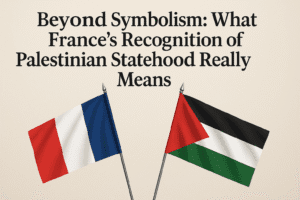Beyond Symbolism: What France’s Recognition of Palestinian Statehood Really Means
France’s recognition of Palestine marks a seismic shift as the first G7 nation to take this step, aiming to revive the moribund two-state solution amid Gaza’s humanitarian crisis. Macron’s move is a strategic gambit to strengthen Palestinian legitimacy and pressure Israel, timed ahead of a key UN peace conference.
While welcomed by Palestine, Spain, and Saudi Arabia, it drew fierce condemnation from Israel (calling it a “launch pad for annihilation”) and the US (a “slap in the face”). Other major powers reacted cautiously: the UK supports future statehood after a ceasefire, Germany explicitly rejected following suit for now, and Canada/Australia reiterated support in principle without commitment.
This bold act fractures Western unity, reframing Palestinian statehood not as an end goal of negotiations, but as a necessary catalyst to restart them, directly challenging Netanyahu’s rejectionism and reshaping the diplomatic battlefield. Its true impact hinges on whether France can build a coalition powerful enough to translate symbolism into tangible change.

France’s decision to formally recognize Palestine as a state marks a seismic shift in Western diplomacy. While over 140 UN members already extend recognition, France becomes the first G7 power to take this step. President Macron framed it as a necessary move to revive the moribund two-state solution amidst Gaza’s humanitarian catastrophe. But the announcement triggered immediate condemnation from Israel and the US, exposing deep geopolitical fractures.
Decoding the Recognition:
- Primarily Diplomatic & Symbolic: Recognition doesn’t instantly create borders, institutions, or alter realities on the ground. Israel remains the occupying power in the West Bank and East Jerusalem, and Hamas governs Gaza.
- A Strategic Gambit for Peace: Macron aims to inject momentum into the two-state solution – the long-envisioned outcome where Israel and Palestine coexist peacefully within defined borders. By acting before final status negotiations, France hopes to strengthen the Palestinian Authority’s legitimacy and counter Israel’s relentless settlement expansion, which undermines a viable future state.
- International Pressure Amplified: This move significantly raises the diplomatic cost for Israel and its allies opposing Palestinian statehood. It signals that key Western powers may no longer wait indefinitely for Israel’s approval.
Why France, Why Now?
- Pre-UN Positioning: Macron’s letter precedes a major UN conference co-hosted by France and Saudi Arabia focused explicitly on the two-state solution. Recognition provides France significant leverage and moral authority heading into these talks.
- Gaza’s Unfolding Catastrophe: The devastating humanitarian crisis, widespread starvation, and collapsing infrastructure in Gaza created an urgent impetus. Macron views recognition as a tool to push towards a political resolution inseparable from immediate aid needs.
- Filling a Leadership Vacuum: With the US locked in unwavering support for Israel and the UK hesitant, France seized an opportunity to assert European diplomatic influence.
Global Ripples: Will Others Follow?
France hasn’t acted in isolation, and its move will likely trigger further diplomatic shifts:
- Saudi Arabia & Arab States: Publicly commended France. Likely to use this momentum to push other hesitant nations. The upcoming France-Saudi UN conference is now a critical focal point.
- Spain: Already recognizes Palestine and strongly endorsed France’s decision, urging others to follow to “protect what Netanyahu is trying to destroy.”
- The UK: Under Prime Minister Starmer, maintains recognition should come after a ceasefire as part of final negotiations, resisting immediate calls from over 221 MPs. Focus remains on Gaza’s humanitarian emergency first.
- Germany: Stressed commitment to a two-state solution “in the longer term” but explicitly stated it will not follow France’s lead for now, prioritizing ceasefire, hostage release, and aid.
- Canada & Australia: Echoed support for a two-state solution in principle but stopped short of committing to recognition, aligning more closely with the UK/Germany stance.
- Italy: Emphasized any Palestinian recognition must explicitly include recognition of Israel – highlighting a core concern for many Western states.
- Other European Nations: Ireland, Spain, Norway, Sweden, and several Eastern EU members already recognize Palestine. France’s move increases pressure on remaining EU holdouts like Germany and the Netherlands.
The Stark Realities & Challenges Ahead:
- Israeli Rejection: Netanyahu denounced recognition as a “launch pad to annihilate Israel.” His government fundamentally opposes Palestinian statehood, especially post-October 7th.
- US Opposition: Secretary Rubio called it a “slap in the face” to victims, underscoring the deep US-Israel alignment remains unshaken.
- The Settlement Quandary: Over 600,000 Israelis live in settlements across the occupied West Bank and East Jerusalem – territories essential for any viable Palestinian state. Dismantling these or incorporating them poses an immense, potentially insurmountable, obstacle.
- Gaza’s Future & Hamas: Who governs Gaza in a future state? How is Hamas disarmed or integrated? These questions remain unanswered and fraught.
- PA Legitimacy: The Palestinian Authority, weakened and unpopular, must demonstrate it can effectively govern and represent all Palestinians for statehood to be meaningful.
The Human Insight:
Macron‘s move is less about instantly changing facts on the ground and more about reshaping the diplomatic battlefield. It’s a calculated effort to break the Western paralysis on Palestine, leveraging the horror in Gaza to force a long-avoided reckoning with the political future. By acting unilaterally among the G7, France challenges the notion that Palestinian statehood must wait for Israel’s blessing – a stance increasingly seen as enabling endless occupation and undermining regional stability.
Will others follow? Not immediately en masse among major Western powers. But France has opened a crucial door. The focus now shifts to the upcoming UN conference and whether Macron can build a coalition powerful enough to translate symbolic recognition into tangible diplomatic pressure for a ceasefire, meaningful negotiations, and ultimately, a just and lasting peace based on two sovereign states. The path is perilous, but the status quo, as Gaza screams, is untenable. France has gambled that recognizing Palestine isn’t the end of the peace process, but perhaps the only way left to start it anew.
You must be logged in to post a comment.